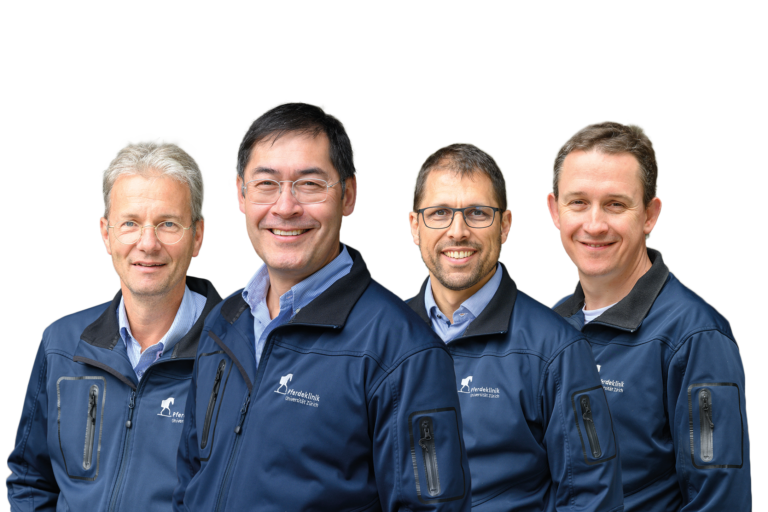
The Equine Hospital at the Vetsuisse Faculty, University of Zurich, has a vision that is also the mission of the people who work there: they have made it a priority to be there for the horse at all times, together and with passion. And it is no empty phrase; one can see and feel that they live this motto day by day. This not only includes the love for the animals, even though this may have been the motivating force for all of them once. Entering this profession means to make it a vocation. Constant effort is required to keep up with the latest scientific research, and to provide the most innovative and promising diagnostic and treatment methods worldwide – all for the good of the patients.
Continuing education is a top priority at this hospital. Skills and knowledge are constantly being pushed to the next level. The bosses, Professor Colin Schwarzwald, head of the Equine Department since 2017 and member of the Executive Board of the University Animal Hospital, and his colleague, Professor Anton Fürst, who previously held this post, are no exception. They are both proven experts in their fields, they both enjoy an international reputation, and both have undertaken additional training in the USA and elsewhere. Schwarzwald is a team player who studied in Zurich and worked at The Ohio State University between 2001 and 2006. Here he established an outstanding reputation as an internist and cardiologist. He then became senior lecturer in Zurich and, in 2013, Director of the Clinic for Equine Internal Medicine. The heart specialist devotes his scarce free time to his photography hobby and is involved in a zoo. In Zurich he introduced electrical cardioversion for treating atrial fibrillation, a treatment method provided by very few other clinics in Europe.
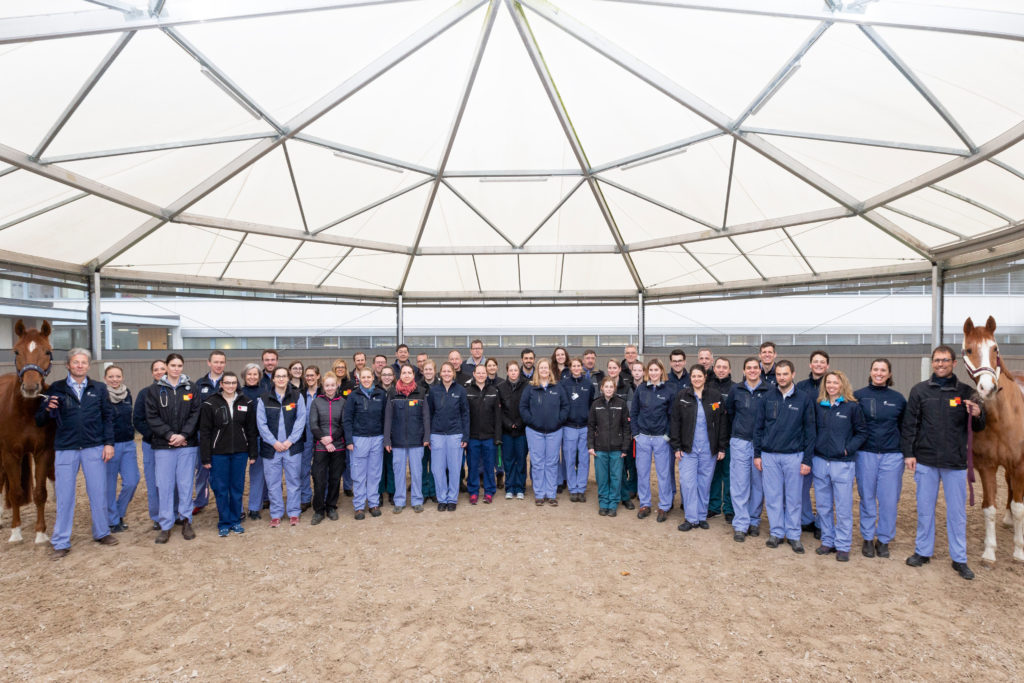

Fürst, a native of Vorarlberg in Austria, studied in Zurich and also spent some time at The Ohio State University. He specialises in orthopaedic surgery. Following in the footsteps of his father, who was a veterinarian as well, he is a hands-on visionary. Together with other researchers, he developed special plates that can be used to successfully treat fractures that were previously very difficult to treat. He is also very well known in the equestrian sports scene: For 17 years, he cared for the Swiss dressage team and accompanied them to numerous championships.
The broad-based hospital also has space for future-oriented specialties such as equine sports medicine. After his studies and doctorate in Berne, Professor Michael Weishaupt took up the challenge in 1994 to develop this area of expertise in Zurich. He specialises in treadmill exercise tests in horses. On the one
hand, these are used to quantify and optimise performance. On the other hand, they also serve to identify the underlying diseases in patients with poor performance and the early detection of subclinical orthopedic, respiratory and cardiovascular diseases. The University Equine Hospital in Zurich has the world’s only gait laboratory with an instrumented equine treadmill developed in-house, which measures the vertical ground reaction forces of the four limbs and, together with high-speed cameras, can identify lamenesses that are difficult to localise. Last but not least, the Ophthalmology section, led by Professor Simon Pot, is also part of the Equine Hospital, although this unit treats eye diseases in all animal species. It offers a wide range of state-of-the-art examination and treatment options for ophthalmic diseases that are available in only a few other hospitals worldwide.
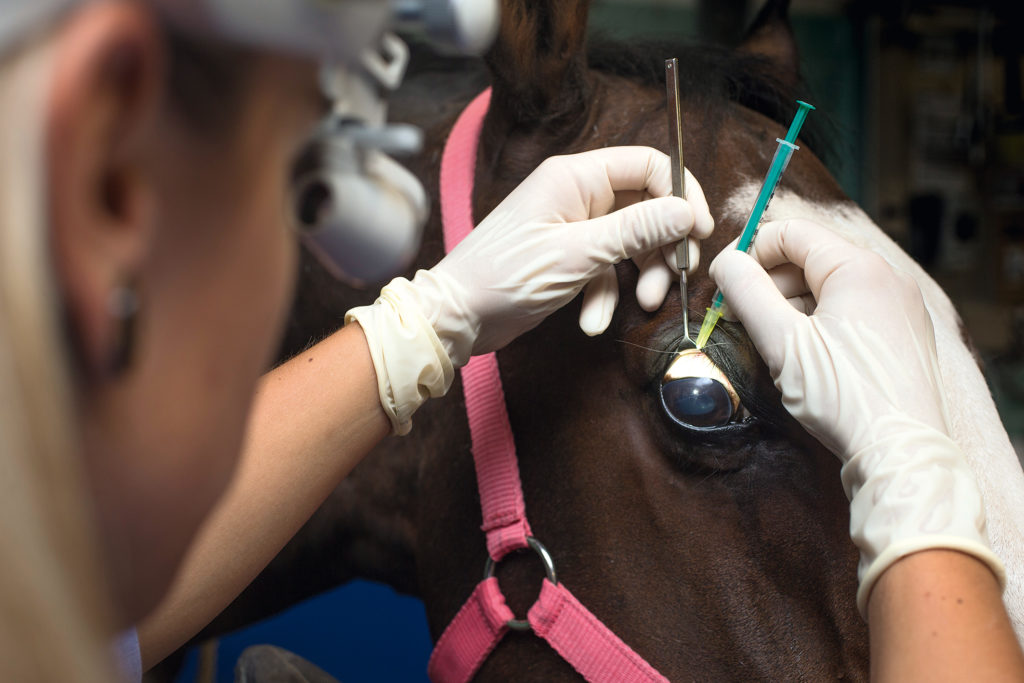

Central to Zurich’s success model is the interdisciplinary collaboration with renowned specialists in all fields and access to collective knowledge and facilities in a wide range of disciplines that only a university can provide. Specialists in reproductive medicine, anaesthesia, diagnostic imaging and laboratory medicine work side by side with the Equine Hospital team. They also work closely with the Large Animal Rescue Service Switzerland/Liechtenstein, which uses specially equipped vehicles to bring even the most urgent emergency patients safely and gently to the hospital. The hospital provides a comprehensive range of treatments and services, and the clientele is just as varied: ranging from famous international competition horses to leisure horses and animal welfare cases.
“Continuing education is a top priority, skills and knowledge are constantly being pushed to the next level”
“The broad-based hospital also has space for future-oriented specialties such as equine sports medicine.”
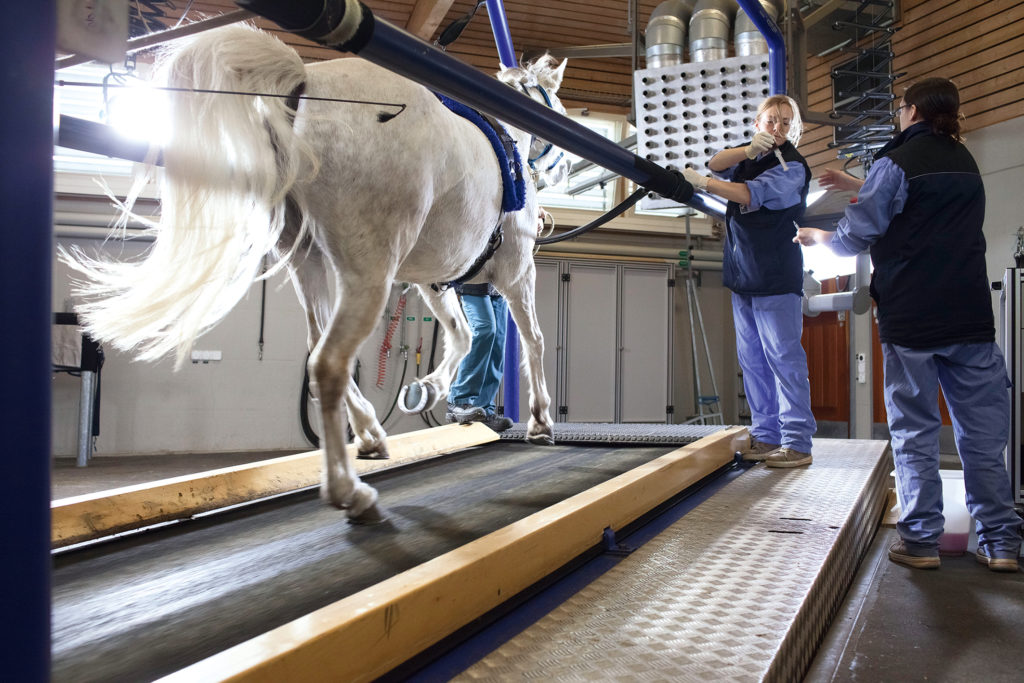

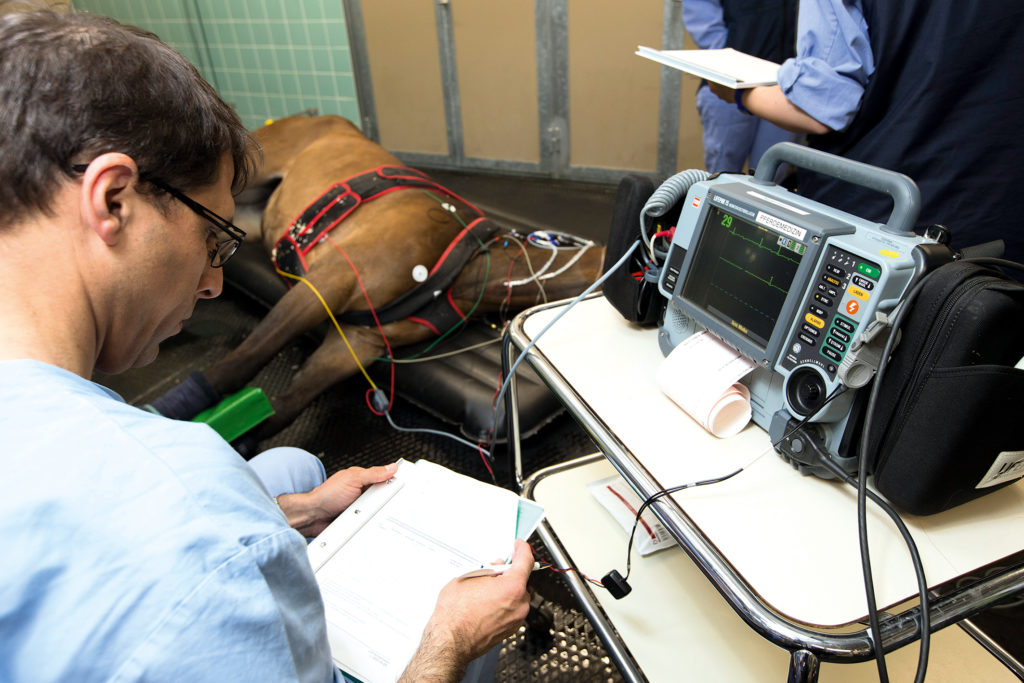

Our services for you:
Routine prophylactic treatments and pre-purchase examinations are also part of the range of
services. Twenty-six internationally recognised specialists in different areas of expertise take care of the four-legged patients, and they are supported by a further 45 vets, 20 veterinary nurses and 2 farrier teams. They guarantee comprehensive care for both inpatients and outpatients. And they always
remain true to their common vision – at all times together and with passion for the horse.
1. Veterinarians
71
Specialists with internationally recognised (European / US) qualifications
26
Specialists with national qualifications
4
Veterinarians, assistant veterinarians
41
2. Veterinary technicians and horse grooms with additional medical training
18
Interns
+ 2
3. Horse grooms
–
4. Administrative staff
4
5. Other staff
5
6. Box stalls
42
Normal equine box stalls
30
Padded box stalls
2
Box stalls for mares with foals
4
Isolation box stalls
6
7. Examination / treatment rooms
4
8. Operating rooms
3
For procedures on standing horses
1
For procedures on lying horses
2
9. Paddocks
1
10. Pastures
–
11. Horse walker
1
12. Other
Scales for large animals & foals; covered lunging arena; 3 examination tracks (2 hard, 1 soft, 1 covered); 2 solariums; instrumented high-speed treadmill
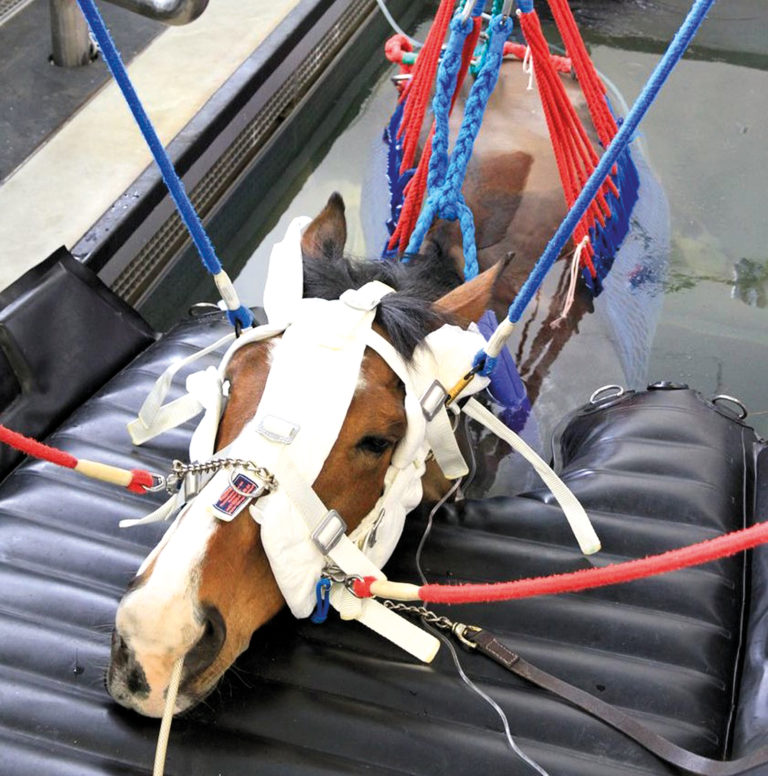

71
internationally recognised veterinary surgeons in different areas of expertise take care of the four-legged patients
Weighting of the specialist areas for Equine Hospital of the Vetsuisse Faculty, University of Zurich
Soft tissue surgery
Weighting: 81 to 100%
Equine soft tissue surgery primarily relates to abdominal/colic surgery and operations in the region of the urinary system, the sexual organs, and the upper and lower respiratory tracts, as well as operations on the skin.
Orthopaedic surgery
Weighting: 81 to 100%
Orthopaedic surgery is surgery on the musculoskeletal system of a horse. This includes operations relating to the bone skeleton, such as fracture fixation. It also includes endoscopic and arthroscopic procedures on joints, bursae and synovial sheaths, as well as operations on ligaments and tendons.
Orthopaedic diagnostics & therapy
Weighting: 81 to 100%
The field of orthopaedic diagnostics & therapy deals with musculoskeletal diseases and disorders, particularly relating to lameness.
Dentistry
Weighting: 81 to 100%
Dentistry involves prophylactic examinations of teeth and the oral cavity as well as the diagnosis and treatment of dental diseases and associated diseases of the paranasal system.
Internal medicine
Weighting: 81 to 100%
The specialist field of internal medicine subsumes a number of subareas and deals with the diagnosis and treatment of diseases of the internal organs. These include diseases of the gastrointestinal tract, the respiratory system, the urinary system, the blood and blood-forming organs, the muscles, the nervous system and the skin, plus hormonal and metabolic disorders and all infectious diseases.
Cardiology
Weighting: 81 to 100%
Cardiology is a separate specialty within the field of internal medicine and concerns the diagnosis and treatment of cardiovascular diseases and disorders, including cardiac arrhythmias, valve disorders, myocardial and pericardial disease and congenital cardiac malformations.
Intensive care and emergency medicine
Weighting: 81 to 100%
Intensive care and emergency medicine involves administering first aid in serious emergencies as well as providing care to and monitoring horses and foals with life-threatening illnesses. This also includes post-operative care to patients in need of intensive care.
Neonatology
Weighting: 81 to 100%
The field of neonatology is concerned with the diagnosis and treatment of all diseases and disorders experienced by newborn foals. The fields of internal medicine, intensive care and emergency medicine also play a central role in such care.
Sports medicine
Weighting: 81 to 100%
Sports medicine entails the diagnosis and treatment of performance-related diseases and illnesses in sport horses and workhorses. Special dynamic examination methods are often used in this field, including performance tests, endoscopy during exercise, kinetic and kinematic gait analysis, and saddle pressure measurements.
Rehabilitation medicine
Weighting: 21 to 50%
The field of rehabilitation medicine is concentrated on recovery following surgical procedures, medical movement therapy to treat back pain and abnormal posture, and improving the quality of life of animals suffering from debilitating diseases such as arthritis or neurological impairments.
Ophthalmology
Weighting: 81 to 100%
Ophthalmology deals with diseases and functional disorders of the eyes, their adnexa, and the optic nerve up to the visual cortex in the brain – the visual processing centre. Ophthalmologists also perform surgical procedures on eyes.
Reproduction medicine
Weighting: 81 to 100%
Reproductive medicine involves the diagnosis and treatment of diseases relating to the sexual organs and the udders as well as breeding suitability tests, assisted reproduction, pregnancy-related diagnostics and obstetrics.
Anaesthesia
Weighting: 81 to 100%
The specialist field of anaesthesia is concerned with professionally sedating and anaesthetising horses and sparing them unnecessary pain. Thanks to state-of-the-art methods and gentle techniques, it is now possible to perform complicated surgical procedures and life-saving emergency operations on seriously injured or sick horses and to transport them safely.
Diagnostic imaging
Weighting: 81 to 100%
Diagnostic imaging is the process of examining a horse using digital X-ray technology, ultrasound, computed tomography (CT), magnetic resonant imaging (MRI) and scintigraphy. Nowadays, many of these diagnostic techniques do not require general anaesthesia and can be performed on a standing horse.
Transport services
Weighting: 81 to 100%
Professional large-animal transport services safely transport seriously injured or diseased horses – such as horses with severe colic – to an equine hospital. Horses with complex fractures or severe neurological conditions can also be transported safely and with due care, either using a harness to alleviate the load on the fracture or by lying the animal on a mat. The same applies for transporting recumbent horses. Some largeanimal transport services also specialise in recovering horses from extreme situations, such as rescuing horses who have fallen using a winch, crane or helicopter.
Weighting of the specialist areas: range of services offered compared with the maximum service spectrum in the corresponding area.
Equine Hospital of the Vetsuisse Faculty, University of Zurich
Winterthurerstrasse 260, 8057 Zürich

